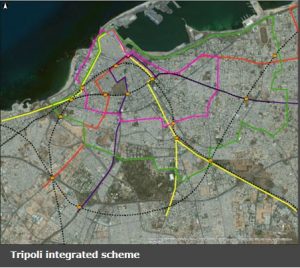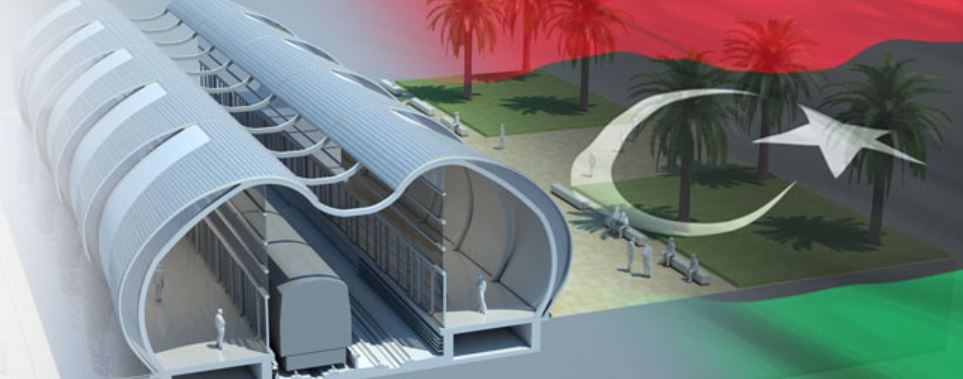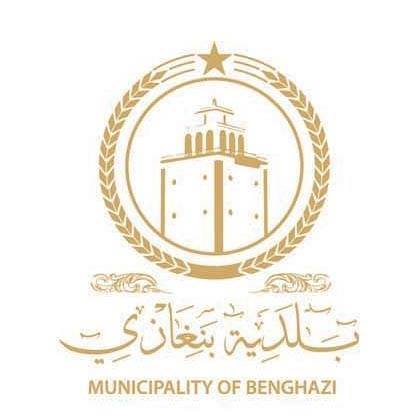By Sami Zaptia.

London, 6 August 2019:
Further to the announcement Sunday by the internationally-recognized Libyan government of a Chinese-led consortium considering implementing Tripoli’s metro and bus network ‘‘without any Libyan sovereign financial guarantees or spending’’ – this financing claim can now be dismissed. We can also reveal the UK, French, and German partners in the consortium.
The BFI consortium
The Chinese-led consortium is called BFI Management and includes a British, French and German partner. It was formed specifically to participate and win the Libyan Government Tender for the Design, Procurement, Construction Contract, for Tripoli Metro Line “B”, now called Line “1”, which started in 2009. Saleh Ibrahim, as the Libyan representative joined that foreign consortium and turned it into the joint venture: BFI Management as the chairman of its board.
The international consortium will manage, finance, design, construct, operate and maintain the Tripoli Metro and Integrated Bus Systems, as well as nominated infrastructure projects.
Financing
However, contrary to what the internationally recognized Libyan government’s Economy Minister claimed during his announcement on Sunday – namely that the Libyan state will offer ‘‘no guarantees’’, the BFI consortium clearly says that the projects will be ‘‘under a Government of China to Government of Libya (G to G) Preferential Financing and Libyan domestic capital, solely for The Project’’.
It further explains that under BFI Management’s leadership, together with the cooperation of the Libyan Government, it will deliver the project(s), and operate and maintain the project(s), ‘‘under the Long-Term Lease Agreement’’.
It adds that ‘‘The Project Company combines the work of BFI and COVEC-CRIG Consortium and Libyan Financial Institutions’’ and that a ‘‘combination of equity capital and project debt will pay for the Project’’.
It says that the ‘‘Libyan Government will hold ownership of all fixed Project Company assets on completion of The Project’’
Consortium members
The Chinese side of the consortium is led by China’s giant China Overseas Engineering Group Co. Ltd. (COVEC) and CRIG. COVEC is a fully funded subsidiary of China Railway Group Limited (CREC) and CRIG is the international division of China Railway Group Limited (CREC) and a Fortune 500 Company.

COVEC-CRIG will be the sole EPC contractor and will also facilitate the G to G Preferential Financing for all EPC contracts. It will also operate and maintain the Project for the ‘‘Long Term Lease Period’’.
The other members of the consortium are Britain’s Arup, France’s Alcatel-Lucent and Germany’s Herrenknecht.
The Metro project and integrated bus systems
The metro system will extend to over 100 km of dual tracking with over 70 stations ranging from deep underground to elevated stations. The metro will be built in three phases with intersecting Lines 1, 2 and 3. Line 1 will be completed within 5 years with Lines 2 and 3 completed within 9 years.

The stations will be air conditioned or climate controlled with ‘‘state-of-the-art facilities and amenities’’ and trains will be the latest fully tested German designs. The Metro systems will have its own independent electricity generation capacity.
The consortium says that the Integrated Bus Systems and the Metro Systems will complement each other. The planning concept is to provide public transport to within 200 m of the majority of the city’s residents.

The bus system will use electric buses which will be air conditioned, comfortable and secure, with all passengers seated. Buses will operate to published schedules. The operation of up to 1,000 electric buses per city will be implemented over 5 – 6 years. The consortium also says that ‘’tens of thousands of permanent full-time careers and jobs will be filled by Libyan citizens’’ as a result of the projects.
https://www.libyaherald.com/2019/08/05/chinese-led-foreign-consortium-to-invest-and-implement-tripoli-metro-and-bus-network/
https://www.libyaherald.com/2014/04/01/tripoli-and-benghazi-metro-systems-moving-forward/
https://www.libyaherald.com/2019/07/10/first-batch-of-public-transport-buses-shipped-from-china/
https://www.libyaherald.com/2017/11/08/new-bus-operations-for-tripoli-and-benghazi/
https://www.libyaherald.com/2014/04/30/tripoli-and-benghazi-lrt-systems-progress/







